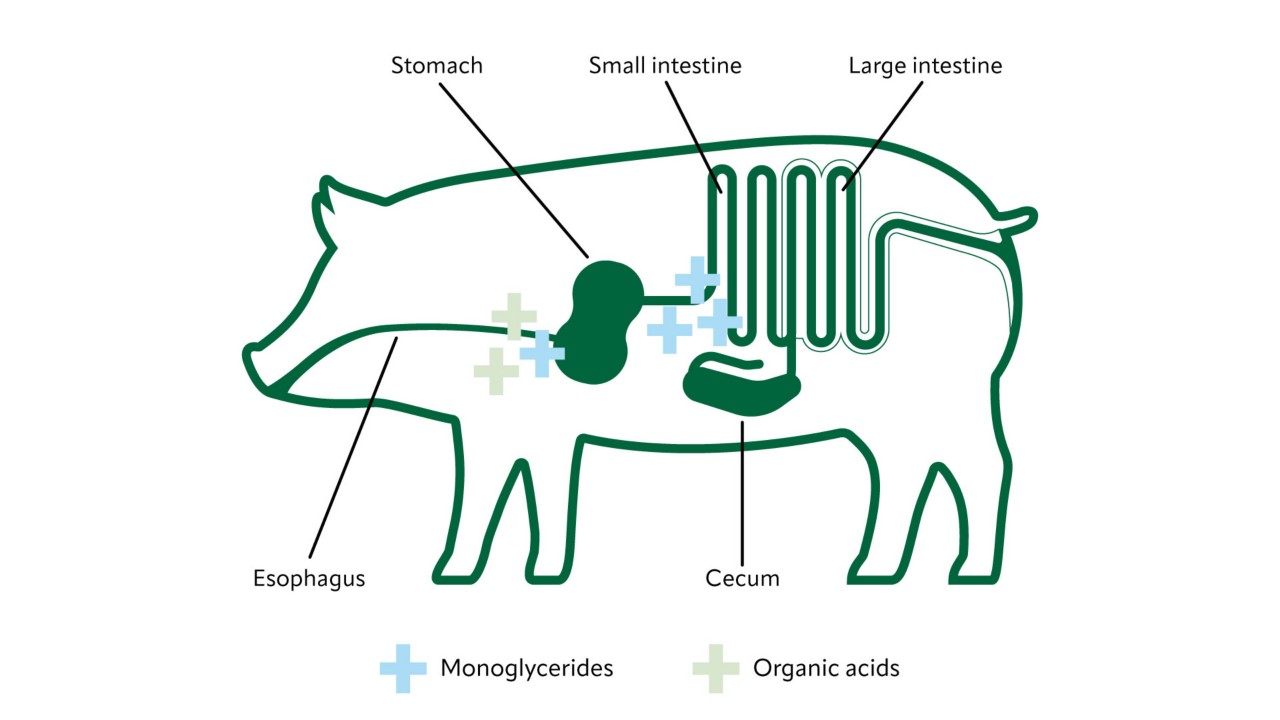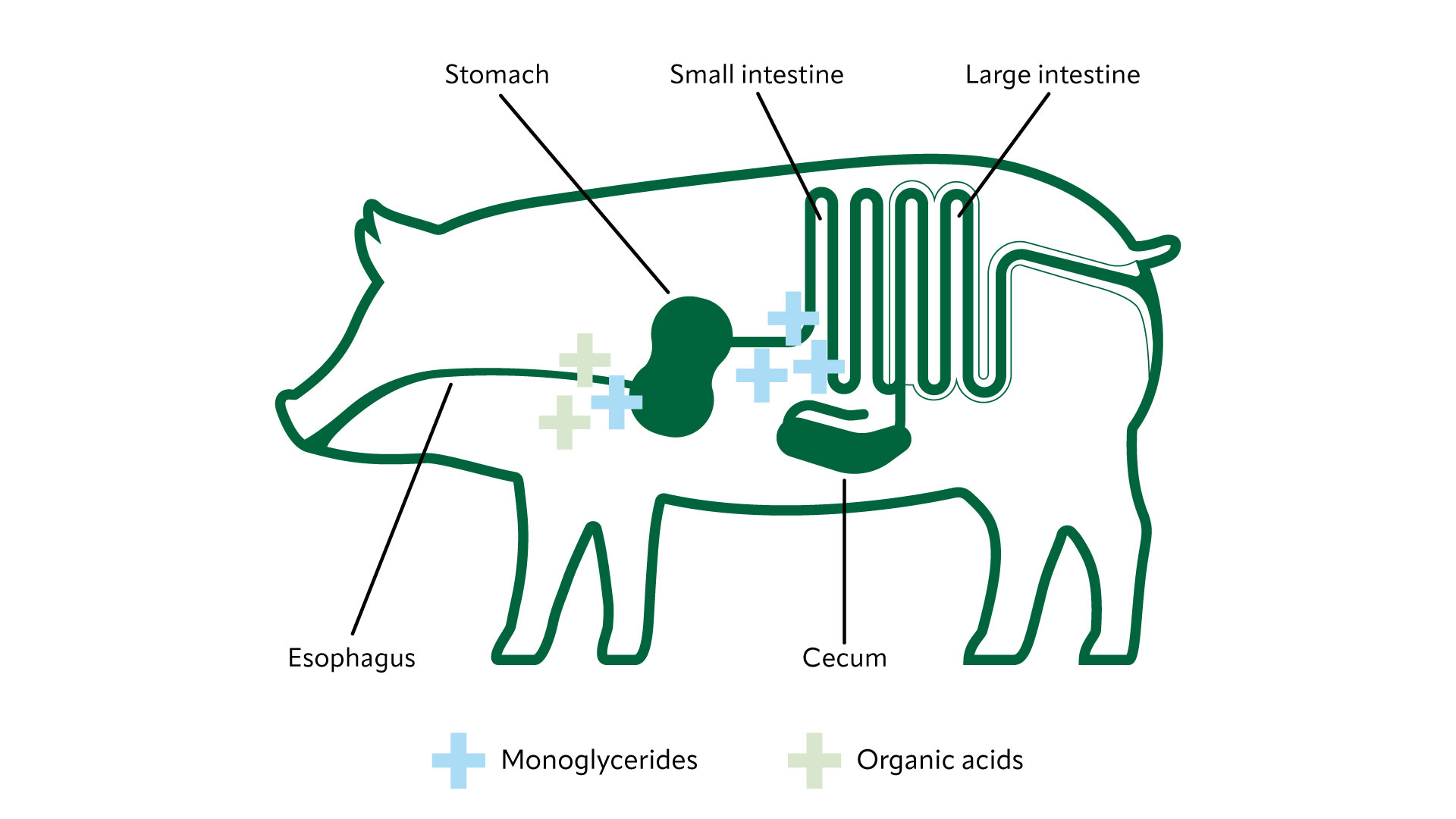The transition from milk to solid feed during the weaning phase is a critical period for piglets, marked by postweaning stress and the onset of various physiological and nutritional challenges. One of the most pressing issues during this time is the susceptibility of young pigs to pathogenic bacteria, particularly enterotoxigenic Escherichia coli (ETEC), which can lead to nonoptimal piglet productivity and severe health problems, including increased mortality rates.
In addition to bacterial infections, the immature guts of piglets cause inefficient protein digestion and feed absorption that affects their overall health and growth performance. We will explore the importance of organic acids and monoglycerides as a strategy to address mitigate these challenges by enhancing gut health, improving feed digestibility and inhibiting the pathogenic activity of ETEC.
The challenges in nursery production
Postweaning stress arises from several factors, including dietary changes, social stress from mixing groups and environmental changes. These stressors can compromise the gut barrier function, leading to an increased risk of bacterial infections, particularly from ETEC. ETEC can proliferate rapidly in the immature gut, resulting in diarrhea, dehydration and other serious health complications. Addressing these issues is crucial for ensuring the welfare of piglets and the economic viability of pig production.
The role of organic acids
Acidification is a well-established strategy in swine nutrition, particularly in the management of gut health in piglets. By lowering the pH of the stomach, acidification creates an environment that is less favorable for pathogenic bacteria like ETEC. This not only helps control bacterial populations but also enhances the overall digestive process through two distinctive paths:
Better control effects of pathogenic bacteria: Acidification helps reduce the proliferation of harmful bacteria by creating an acidic environment.
Improved feed digestibility: The inclusion of organic acids, such as formic or lactic acid, in piglet diets enhances protein digestibility and feed absorption. Lowering the stomach pH aids in the breakdown of feed components, increasing nutrient availability and promoting better growth rates.
The benefits of short- and medium-chain monoglycerides
Short- and medium-chain monoglycerides have beneficial effects on gut health and immune function. These compounds exhibit several properties that can support piglet health during the critical postweaning period in three aspects:
Better control effects of pathogenic bacteria: Monoglycerides (C8+) have demonstrated efficacy in reducing the growth of various pathogenic bacteria further in the proximal intestine. They disrupt bacterial cell membranes, leading to cell lysis and death. This action can significantly reduce the bacterial load in the gut, reducing the negative effects these harmful bacteria can have.
Inflammation control: Monoglycerides can help modulate inflammatory responses in the gut. By promoting a balanced immune response, they may reduce the likelihood of excessive local and systemic inflammation that can occur due to bacterial infections and stress, fostering a more productive animal.
Immune system support: Monoglycerides enhance the immune system's functionality through stimulating the production of immunoglobulins and other immune factors, providing piglets with systemic effects against pathogens during the vulnerable postweaning period.


How can Eastman help with your postweaning challenges?
Headquartered in Kingsport, Tennessee, Eastman is a global producer of organic acids and monoglycerides. The U.S. animal nutrition team has developed tailored Eastman solutions — including Acitra, Entero-Nova and Protaq — that deliver monoglycerides and/or organic acids in combinations most effective for the challenges faced by U.S. producers. These solutions can be applied through feed or drinking water.
The combined strategies of acidification and the inclusion of short- and medium-chain monoglycerides represent effective approaches of reducing pathogenic activity, promoting feed digestibility, controlling local and systemic inflammation, and supporting the immune system. These nutritional interventions contribute to enhanced piglet health and improved growth performance. Producers, nutritionists and veterinarians are encouraged to consider incorporating these strategies into their management practices. By optimizing piglet health and strengthening immune responses, they can enhance overall farm productivity and animal welfare.
Contact your Eastman animal nutrition representative or contact us at eastman.com/animalnutrition.




